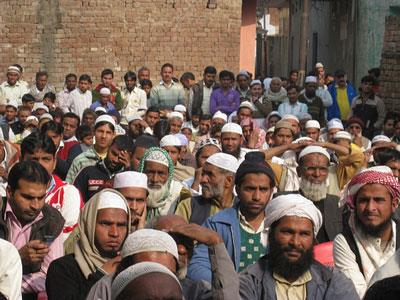Political Marginalization Worries India Muslims

“In principle, any vibrant democracy is supposed to provide adequate representation to all communities as per their numerical strength,” political analyst Rasheed Kidwai told OnIslam.net.
“However, given Indian Muslims’ distance from the ruling BJP, the number of Muslims in legislative bodies is on the decline.”
With the rise of hard core Hindu nationalist Bhartiya Janata Party (BJP) in India, Muslim representation in Parliament and state assemblies has sharply fallen.
The 16th Lok Sabha (lower house of the Parliament) formed in May this year with Prime Minister Narendra Modi winning with thumping majority witnessed Muslim representation in the Parliament hitting an all-time low at 22. The previous low was in 1957 when just 23 Muslims were elected.
Even in the previous 15th Lok Sabha, when the Congress-led United Progressive Alliance (UPA) government was in power at the Centre, the Muslims were under-represented. The number of the Muslim Members of Parliament (MPs) in the 15th Lok Sabha was 28 and 14th had 34 Muslim MPs.
The Muslim population percentage to total population in India is about 10.5 percent.
But the community’s representation in the present Lok Sabha is just 4.2 percent, as there are only 22 Muslim MPs in the House having total strength of 542 seats.
The Muslim representation in State Assemblies is also falling steadily. In most of the states, the Congress party that was often dubbed as sympathetic to Muslims has lost elections.
With BJP coming to power in state assemblies as well, the number of Muslim legislators has dropped further.
Political analysts believe that this trend would continue for some time in India.
“This trend will continue for some time as BJP is unlikely to accommodate Muslim leaders and Congress and other non-BJP parties will find it tougher to get them elected outside pockets of Kashmir, Bengal and Kerala,” Kidwai said.
“There is no easy solution in sight,” he added.
“1939 Formula”
Not surprisingly, Muslims are worried over their failure to get due representation in the country’s governance.
They believe that less representation would mean further marginalization of the community in the biggest democracy of the world.
“I think it is not a good sign for the democracy or the community. We have always suffered in the absence of proper representation, but now the number of Muslim parliamentarian and legislative members is further declining,” said Kamil Ahmed, a Muslim scholar.
“Who is going to listen to us, if we do not have proper representation in those places,” he added.
Last month, United Muslim Front (UMF), an organization working for Muslims, wrote a letter to the President of India demanding revival of the 1939 formula.
The then British government in India had in 1939 implemented it in order to give proportional representation to Muslims.
Front Chairman Shahid Khan had expressed concern over decline in representation in the country and termed the electoral system as flawed.
Many states with sizeable Muslim population have failed to elect even a single Muslim parliamentarian.
In a state like Uttar Pradesh, with a Muslim population of 18.5 percent, not a single Muslim parliamentarian was elected. Many major states have no Muslim representation in the Parliament.
“Failure of the Indian Muslim leaders to represent their community is one of the leading reasons for this situation. Once they get elected, they fail to do anything for the community forcing Muslims to go to leaders of other communities to solve their problems,” said Rajib Ali, a local Muslim leader in Uttar Pradesh state.
“We have also seen that most political parties, who claim to be secular, have used Muslims only for votes,” he added.
In nine BJP-ruled states, there is just one Muslim minister in the state of Rajasthan. This shows how BJP is ignoring Muslims in different states.
Muslim scholar Mufti Shees feels that BJP gives ticket to Muslims candidates to contest elections only for namesake.
“They just have to show that they care for Muslims and by giving ticket to one or two Muslim candidates they try to prove that they care for the community. In most cases, Muslims were given ticket from only those places where party was expected to lose.”
Another Muslim leader Azam Beg feels that the policies of BJP are dividing different communities. “They have created such a situation that hatred between Hindus and Muslims is all time high and in such a scenario even secular Hindus are voting against Muslim candidates,” he added.
The condition is no better even in non-BJP ruled states. Even secular parties like Congress, Samajwadi Party (SP), Janata Dal have now curtailed tickets for Muslims. They fear that giving tickets to Muslims would mean losing more seats.
Source: On Islam



